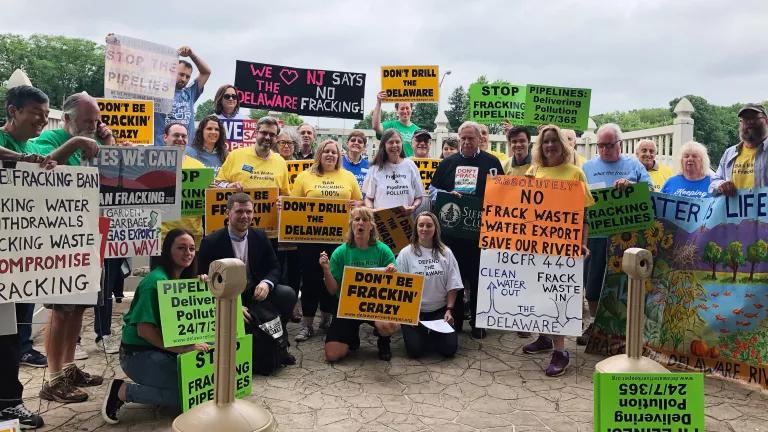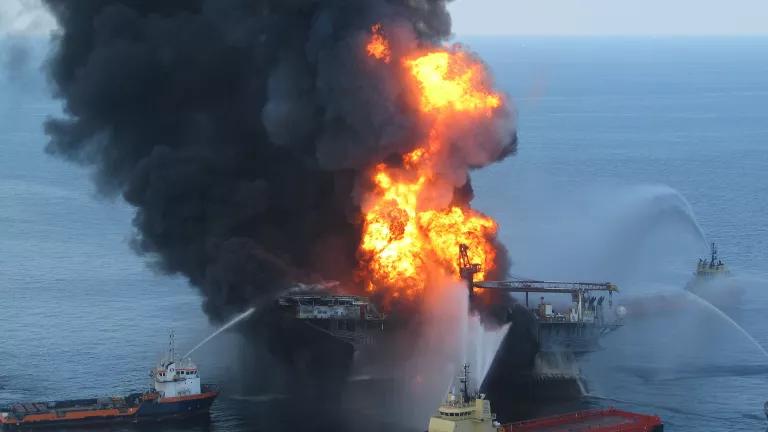NRDC Testifies in Support of Full Fracking Ban in the DRB
NRDC called for a full fracking ban in the Delaware River Basin at a meeting of the Delaware River Basin Commission (DRBC) in West Trenton, New Jersey last week.

Rally after DRBC hearing
Guest-written by Christopher Askew-Merwin and Thomas Wolfe
NRDC called for a full fracking ban in the Delaware River Basin at a meeting of the Delaware River Basin Commission (DRBC) in West Trenton, New Jersey last week. Last fall, the Commission, an interstate body responsible for regulating activities affecting water quality in the Delaware River Basin, released a set of draft regulations that, while banning fracking, failed to ban a host of harmful associated activities, such as the treatment and disposal of fracking waste and the withdrawal of water for fracking purposes.
Last Wednesday, NRDC joined concerned residents, community activists, and environmental advocates to tell the DRBC that protecting the Delaware River Basin as a source of drinking water and natural beauty requires a complete ban on fracking and all related activity within the Basin. The comments ranged from scientific assessments of the effects that withdrawal would have on Basin ecosystems to a college student’s impassioned plea to the Board to care for future generations’ livelihoods. No comments came out in support of fracking in the Basin.
The draft regulations go a long way in permanently ban fracking in the Delaware River Watershed, the catchment area for the longest flowing river east of the Mississippi and a drinking water source for over 17 million people. But these new rules do not go far enough. While the draft regulations are an important step in the right direction, they could still open the watershed to the storage, treatment, and disposal of contaminated fracking wastewater—a toxic mix of water, sand, and as many as 1,000 chemicals. And they could also allow companies to draw freshwater from the watershed for use in fracking elsewhere. Fracking is a highly water-intensive process that requires between three and eight million gallons of water per well, and fracking results in 70 to 90 percent of the water used to be permanently removed from the water cycle.
To truly protect people’s health, our communities, and the environment, the Commission must implement a full ban on fracking that includes all aspects of this dangerous practice.
You can read NRDC’s full comments on the draft fracking regulations here.
And below are our statements made before the DRBC last week:
“NRDC supports a full ban on fracking in the Watershed, inclusive of drilling, the withdrawal of freshwater for fracking elsewhere, and wastewater treatment, storage and disposal. At a time when the federal government is doing all it can do increase our dependence on dirty fossil fuels, you, the Commissioners, have an opportunity to chart a new path forward and reject fracking and its associated activities in the watershed.
“A recent EPA analysis on the efficacy of fracking wastewater treatment facilities found that even after treatment, wastewater can harm human health. Multiple states, including New York and Maryland, have banned fracking citing health concerns.
“Yet, despite extensive evidence pointing to the harms of fracking and all of its associated activities, the DRBC has issued incomplete draft regulations. The peer reviewed science points to the need for a full ban. Now is the time to act.
“Opening the river basin to any aspect of fracking, would imperil the air, water, land, and the health of our communities for generations to come. Instead of relying on dirty and dangerous fossil fuels of the past, we must transition our local economies toward industries that do not destroy our drinking water, pollute our land, and make our loved ones sick.
“The bottom line is that half-measures can’t fully protect our communities and the environment from the dangers of fracking and its associated activities. Let’s not turn our communities into industrial zones.”
—ROB FRIEDMAN, POLICY ADVOCATE
“I’d like to spend my 2 minutes explaining to you how a ban on all of these activities—including the treatment and disposal of wastewater and the withdrawal of Basin water for fracking elsewhere—would not violate a Constitutional doctrine known as the dormant Commerce Clause, which prohibits states from passing laws that economically isolate or arbitrarily discriminate against articles of commerce from outside their borders.
“Several years ago, Governor Christie famously vetoed a New Jersey ban on fracking wastewater, claiming that such a ban would violate the dormant Commerce Clause. Since then, at least one member of the Commission has repeated this concern about a similar ban in the River Basin.
“We’ve done the analysis, and the law is clear—neither a fracking wastewater ban nor a ban on water withdrawal for fracking purposes would violate the dormant Commerce Clause.
“The nuances of the dormant Commerce Clause are hard to sum up in 2 minutes, but the gist of it is that a state cannot pass a law banning or inhibiting the sale or trade of something just because it originates from outside of the state. Such protectionism, if permitted, would encourage the balkanization of state economies and undermine the union, so only Congress is empowered to pass such laws. If the state bans or limits a good or service that just happens to be from out of state, it must do so for a good reason—in other words, it must do so for a legitimate public interest.
“As a preliminary matter, it is unclear whether the Commission, as a state/federal agency acting in accordance with a Congressionally-approved interstate compact, is even subject to the dormant Commerce Clause. Indeed, the Supreme Court has found that a Congressionally-approved interstate compact falling within the Compact Clause of the U.S. Constitution is federal law, which is not limited by the dormant Commerce Clause.
“Second, even if this Commission were limited by the dormant Commerce Clause, neither a fracking wastewater ban nor a ban on water withdrawal for fracking purposes would discriminate against out-of-state commerce, because all wastewater and water withdrawals, produced or withdrawn from any state, would be prohibited in the Delaware River Basin. While it is true that only states with fracking are limited by this ban, the state most likely to be affected by this ban, Pennsylvania, is a voting member of the intergovernmental body that would implement this ban.
“Additionally, a ban on fracking wastewater and water withdrawals for fracking would not be discriminatory because it would be in the public interest—As many have and will testify today, these activities are harmful to both public health and the environment.
“A more thorough analysis of the dormant Commerce Clause is contained in Part 5 our March 30 written comments on the draft regulations, and I respectfully refer you all to that document for more information.
“Thank you.”
—KIMBERLY ONG, STAFF ATTORNEY
“Just as we shouldn’t frack within the Delaware River Basin, we also should not allow fracking companies to ship their waste back into the Basin for disposal. The wastewater produced by fracking contains a cocktail of chemicals that can significantly threaten human health and the environment if accidentally released or improperly disposed of. This wastewater must be transported over hundreds of truckloads of water per well, and there is a high risk that wastewater can spill over the course of these truck trips. This risk is not just theoretical: in Pennsylvania there were eight reported spills between May 2009 and April 2013, resulting in releases of between 4,000 and 57,000 gallons of wastewater reaching surface water resources.
“The Commission should not permit activities with such a high risk of adverse environmental effects within its jurisdiction: the short term economic benefits are not worth the lasting damage that such releases would inflict on our water resources.
“But with or without spills, fostering a fracking waste disposal industry within the Delaware River Basin invites further environmental contamination. Federal guidelines for the release of chemical discharges from water treatment plants have failed to keep pace with the rapidly developing fracking industry, so we simply cannot say for certain that treated water can be released safely into the Basin’s watersheds. In the face of this uncertainty, the Commission shouldn’t gamble with the Basin’s natural resources.”
—TOM WOLFE, NEW YORK REGIONAL INTERN
“The Delaware River Basin is a vital source of freshwater. To allow the exportation of this water for fracking threatens the supply of drinking water for 17 million Americans, roughly 5% of the US population.
“Fracking requires the use of between 3 and 8 million gallons of water per well, an equivalent of a month’s supply of water for over 2,300 people. And this is a one-way road. Unlike other water uses, 70-90% of water for fracking cannot be returned to its original water source.
“Our continued access to freshwater in the Delaware River Basin is already threatened by climate change. Rising seasonal temperatures are projected to significantly reduce the snowpack that feeds this river basin and at the same time increase the likelihood of droughts in this region resulting in reduced water levels.
“To further reduce our available water for an industry that not only contributes to climate change but poisons other sources of water is irresponsible and could result in future water shortages.
Please protect this vital supply of freshwater by completely banning fracking and the exportation of water from this basin.”
—CHRISTOPHER ASKEW-MERWIN, POLICY & SCIENCE INTERN




